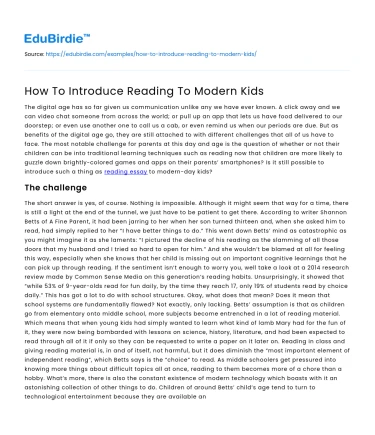The digital age has so far given us communication unlike any we have ever known. A click away and we can video chat someone from across the world; or pull up an app that lets us have food delivered to our doorstep; or even use another one to call us a cab, or even remind us when our periods are due. But as benefits of the digital age go, they are still attached to with different challenges that all of us have to face.
The most notable challenge for parents at this day and age is the question of whether or not their children can be into traditional learning techniques such as reading now that children are more likely to guzzle down brightly-colored games and apps on their parents’ smartphones?
Save your time!
We can take care of your essay
- Proper editing and formatting
- Free revision, title page, and bibliography
- Flexible prices and money-back guarantee
Is it still possible to introduce such a thing as reading essay to modern-day kids?
The challenge
The short answer is yes, of course. Nothing is impossible. Although it might seem that way for a time, there is still a light at the end of the tunnel, we just have to be patient to get there. According to writer Shannon Betts of A Fine Parent, it had been jarring to her when her son turned thirteen and, when she asked him to read, had simply replied to her “I have better things to do.”
This went down Betts’ mind as catastrophic as you might imagine it as she laments: “I pictured the decline of his reading as the slamming of all those doors that my husband and I tried so hard to open for him.” And she wouldn’t be blamed at all for feeling this way, especially when she knows that her child is missing out on important cognitive learnings that he can pick up through reading.
If the sentiment isn’t enough to worry you, well take a look at a 2014 research review made by Common Sense Media on this generation’s reading habits. Unsurprisingly, it showed that “while 53% of 9-year-olds read for fun daily, by the time they reach 17, only 19% of students read by choice daily.” This has got a lot to do with school structures.
Okay, what does that mean? Does it mean that school systems are fundamentally flawed? Not exactly, only lacking. Betts’ assumption is that as children go from elementary onto middle school, more subjects become entrenched in a lot of reading material. Which means that when young kids had simply wanted to learn what kind of lamb Mary had for the fun of it, they were now being bombarded with lessons on science, history, literature, and had been expected to read through all of it if only so they can be requested to write a paper on it later on.
Reading in class and giving reading material is, in and of itself, not harmful, but it does diminish the “most important element of independent reading”, which Betts says is the “choice” to read. As middle schoolers get pressured into knowing more things about difficult topics all at once, reading to them becomes more of a chore than a hobby.
What’s more, there is also the constant existence of modern technology which boasts with it an astonishing collection of other things to do. Children of around Betts’ child’s age tend to turn to technological entertainment because they are available and addictive.
Start them early
For Betts, the challenge will have to be continuous for now, since she can’t very well turn back time to relish the days when her son would find reading such a wonderful form of entertainment. But for those who have young children and are daunted by the fact that they might also reach middle school and swear off reading, the key is to sit down with your kids and actually read with them.
According to ReadingWithYourKids.com, not only does reading with your kids help you form a stronger bond with them, but it also gives them the perfect opportunity to be engaged in vocabulary learning and understanding different experiences of other people, no matter that they are fictional.
Betts put it nicely, describing the process of reading as having windows and mirrors: it’s a process of looking into other people’s lives and experiences (through windows), and a process of looking into one’s self (through mirrors). When children are started off early with reading, they are more likely to develop a love for it, it also helps them be more imaginative, intelligent, and empathic.
Takeaway
Reading with one’s kids is also a good thing because it gives them a chance to well and truly love reading because, as they stumble into new worlds, you, as a parent, are there to guide them and help them learn things. They are able to understand things better because they have people they can ask for their curiosities. The more that parents read with their kids, the more kids understand that the process is entirely worthwhile, and even get to associate it with warm feelings.
Over at Independent UK, Cressida Cowell, author of the “How to Train Your Dragon” books, says the real challenge is getting them to read for the fun of it. You can squeeze as many books as you can in your bookshelves but only if your child willingly takes up the task of reading them will the actual learning begin.
Cowell’s advice is simple; even if you would just wish your son or daughter would just stop watching from YouTube Kids and read the book you thrust in their arms, don’t do it. Instead, take the time to learn which books your child is interested in and let them follow their heart. There is a book for everyone out there.






 Stuck on your essay?
Stuck on your essay?

